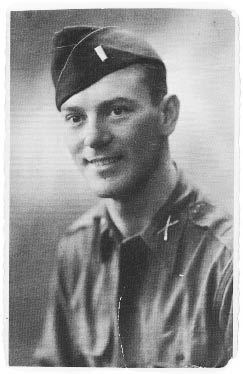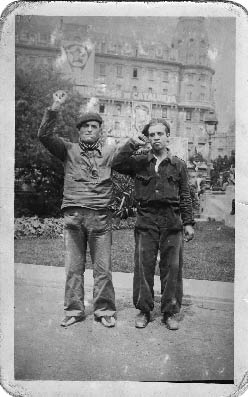Recovering Voices of Unsung Heroes: Documenting Volunteers’ Lives
“My great aunt told me that she was married as a young girl but because she and her husband were both employed by the Writer’s Project they had to keep their union a secret. When her husband went to Spain he had to leave without telling her. She gave me her wedding band which looks like it could be silver or even nickel. She told me her husband was Aaron Lopov and she knew that Alvah Bessie had written about him.…I wonder if there are members of Aaron’s family or anyone who was in the Writer’s Project who know anything about this. My aunt was interrogated by the Dies Committee about the same time. I am holding a transcript of those hearings. She later went on to join the army ‘to fight fascism,’ is how she put it, and was occasionally subjected to threats and intimidation during her career.” Linda Rubin sent this in to ALBA to help us in our initiative to honor the lives of each of the volunteers on our website.
“This letter tells the story of my father Sol Fellman and his brother Harry,” begins another response to ALBA. “The two brothers traveled to Spain together, on the ‘Paris’ in 1937. They were both members of the YCL. Sol was in the Tom Mooney unit.…He was at Jarama, where my uncle Harry was wounded. The letters of Paul Siegel (in the archives) mention a meeting when my father found Harry in August 1937 when he left the line at Jarama, walked up to him and said, ‘Don’t I know you from someplace?’ (My dad had a great sense of humor.)” David Fellman goes on to let us know that his father Sol and Solomon Feldman are two different people, clearing up an error in our database. “Solomon Feldman came from New York and was arrested trying to enter Spain. My father was in the line at Jarama when Solomon was arrested.”
Secret marriages, humor under fire. These memories from family members vividly capture aspects of the human beings who volunteered in the war against fascism in Spain over 74 years ago. As their courageous example continues to inspire generations of activists who respond to the issues of the day, ALBA feels we have a unique opportunity and responsibility to expand on and disseminate each volunteer’s biography. We are combining these oral histories solicited from family members with the information we have from the archives at NYU’s Tamiment collection into a permanent feature on our website. By clicking on biographies, visitors to www.alba-valb.org can find a page for each of the veterans of the Abraham Lincoln Brigade.

Jerry Cook in uniform in service in Belgium, 1945, where he served after his return from Spain. Photo supplied by his daughter, Catherine Cook
The responses often turn into family endeavors as computer savvy sons or daughters assist widows in capturing memories of lifetimes of activism. This excerpt from 94-year-old Anne Yellin’s letter beautifully renders the love and respect in her marriage to veteran Jack Yellin. “I did not know him before he went to Spain. While he was in Spain, my best friend…who was the sister of George Watt, met in Coney Island and became friends and helped organize ‘Friends of the Lincoln Brigade in Brighton Beach.’ In Spain, Jack was sent to the auto park, where he would fix cars, trucks and ambulances and drive them back to the front. On one of these journeys, Jack was very badly wounded, hurt by fire from the fascists.…He was sent to a hospital in Madrid. At first no one knew where he was sent and what hospital he was in. They finally assumed he was dead and his mother was told he had died. As time went on, he was finally found in the hospital in Madrid where he was very much alive.…A couple of years later Jack was stricken with a benign brain tumor, which his brother, a doctor, attributed to being blown up in Spain. When Jack came home in 1938, I met him at a dance at the Diplomat Hotel and fell in love and married him in 1939. When WWII started Jack was not drafted because he was married and had a young child. However, he enlisted and joined the navy where he served until the end of WWII.” One common thread that stands out in the range of responses we’ve received from family members is the pride and respect they feel for the sacrifices of these real life heroes.
One of the most exciting contributions we elicited is featured in another article in this issue of The Volunteer. Veteran Maynard Goldstein, who had attended NYU’s school of journalism and advertising and lives in NYC, sent in “Baseball in Espana” in response to the biography project.
I could not give you a complete picture of our efforts without mentioning the assistance of researchers who, while not related to volunteers, have been inspired by their example. Nacho Eli, a Spaniard, grew up next to the monastery in San Pedro de Cardena, Burgos, Spain, where the International Volunteers were incarcerated during the Spanish Civil War. He started a blog, http://thejailynews.blogspot.com/, named after the underground paper edited in the prison by Lincoln veterans Hy Wallach and Sydney Rosenblatt. The latest information he has sent us comes from his visit to the Public Record Office in Salamanca, where he viewed signatures from 25 prisoners who gave parcel authorizations to other international prisoners. He sent me a copy of the record for the authorization my father, Hy Wallach, signed for his friend at San Pedro, a Yugoslav, Radavoy Nicolitch, a fellow chess player. Eli explains that when a prisoner was released “from countries like the USA, Canada, or England, with strong solidarity groups for the Republic, they normally gave authorization to prisoners from countries like Germany, Austria or Yugoslavia, with right wing governments which stopped attempts at solidarity.…I will send you the other 25 authorizations of American prisoners, mostly from communists to communists.” The blog also documents the efforts of Eli to bring various groups and associations together to erect another commemorative monument at the site of the prison, after the original was removed by local authorities after its installation. Eli states that the “aim of the blog is to draw attention to what happened in the concentration camp and to highlight the ideals of those who fought for them but have been forgotten by official histories.”
His aim expresses our own purposes in undertaking the biography project on each of the volunteers. I know how moved I felt to hear from a person in Spain who was so inspired by the International Volunteers that he continues to use his holidays to travel to public record offices around his country to bring me documentation on my father. The aptness of the characterization of the volunteers as “forgotten heroes” came home to me when I was relating this project to a young Caribbean-American teacher at my school. He asked if I had a title for this article and suggested I call it “Stories of Our Unsung Heroes,” since he told me that although he was a history buff, he was learning about Americans who volunteered in Spain for the first time through this ALBA initiative.
Using the research begun by veteran Adolph Ross and ALBA’s Chris Brooks and from the Tamiment archives, we’ve just started to reach out to families of volunteers to add to the material and to help personalize their biographies. The anecdotes in this article are just a few of the stories that we hope to bring to light on the website and in future issues of The Volunteer. Although the archives contain a wealth of material already donated generously by friends and family, as well as by VALB itself, the database on ALBA’s website makes these highlights immediately accessible. I look forward to sharing many more of the responses that are continuing to come in.
Nancy Wallach is a member of ALBA’s Board of Governors.














There is no entry in the online ALBA biographical list for Sol Fellman. Shouldn’t this be corrected?